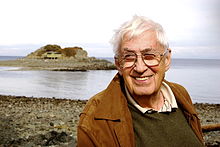C. S. Holling
This article needs additional citations for verification. (February 2016) |
C. S. Holling | |
|---|---|
 | |
| Born | December 6, 1930 Theresa, New York, U.S. |
| Died | August 16, 2019 (aged 88) Nanaimo, British Columbia, Canada |
| Nationality | Canadian |
| Alma mater | |
| Known for | Co-founder of ecological economics |
| Awards |
|
| Scientific career | |
| Fields | Ecology |
| Institutions | University of Florida |
| Thesis | The components of predation as revealed by a study of predation by small mammals of Neodiprion sertifer (Geoff.) (1957) |
| Doctoral advisor | Ian McTaggart-Cowan |
| Doctoral students | |
Crawford Stanley "Buzz" Holling, OC FRSC (December 6, 1930 – August 16, 2019) was a Canadian ecologist, and Emeritus Eminent Scholar and Professor in Ecological Sciences at the University of Florida. Holling was one of the conceptual founders of ecological economics.[1][2][3][4]
Biography
Crawford Stanley Holling was born in 1930 in the United States to Canadian parents. He grew up in Northern Ontario, which was where he first became interested in nature. As a teenager he was a member of the Royal Ontario Museum's Toronto Junior Field Naturalists.
Holling received his B.A. and M.Sc. at the University of Toronto in 1952 and his Ph.D. at the University of British Columbia in 1957. He worked for several years in the Canadian Department of Forestry in Sault Ste. Marie, Ontario.
After working for
He retired from the University of Florida in 1999, but remained on the faculty as an Emeritus Eminent Scholar.
He was awarded two major awards from the
He was founding editor-in-chief of the open access on-line journal Conservation Ecology, now renamed Ecology and Society.[6] He was also the founder of the Resilience Alliance, an international science network.[6]
Work
Throughout his research, C. S. Holling blended
His early work included major contributions to population and behavioural ecology. Later, he was among the first ecologists to recognize the importance of nonlinear dynamics. This early work on predation led to a series of papers, including his 1959 Citation Classic paper in the Canadian Entomologist, in which he developed the notion of functional response (the relationship between prey density and the rate at which prey is eaten), an idea that continues to be a linchpin of modern population ecology.
His 1973 paper on the
His work is frequently cited in the fields of ecology,
Literature
C.S. Holling has edited or co-edited several books:
- 1978. Adaptive environmental assessment and management. (Editor) London: John Wiley & Sons.
- 1995. Barriers and bridges to the renewal of ecosystems and institutions. Edited with L. Gunderson and S. Light (editors) New York, NY: Columbia University Press.[7]
- 2002. Panarchy: understanding transformations in human and natural systems. Edited with L. Gunderson, (editors) Washington, DC: Island Press.
- 2008. Discontinuities in Ecosystems and Other Complex Systems. Edited with Craig R. Allen, New York, NY : Columbia University Press.
- 2010. Foundations of ecological resilience. L. H. Gunderson, C. R. Allen, and C. S. Holling, (editors): Island Press.
C.S. Holling's most cited articles include:
- 1959 "The components of predation as revealed by a study of small mammal predation of the European Pine Sawfly". in: Canadian Entomologist. Vol 91 : 293–320.
- 1973. "Resilience and stability of ecological systems". in: Annual Review of Ecology and Systematics. Vol 4 :1-23.
- 1978, with D. Ludwig, D. and D.D. Jones. in: "Qualitative analysis of insect outbreak systems". Journal of Animal Ecology. Vol 47 (1): 315–332.
- 1990, with C.J. Walters, "Large-scale management experiments and learning by doing", in: Ecology. Vol 71 (6): 2060-2068
- 1992, "Cross-scale Morphology, geometry, and dynamics of ecosystems". in: Ecological Monographs. Vol 62 (4): 447-502
- 1996, with G.K. Meffe. "Command and control and the pathology of natural resource management". in: Conservation Biology. Vol 10 (2): 328–337.
References
- ^ "In Memoriam Buzz Holling". University of British Columbia. September 13, 2019.
- ^ "Pioneering the Science of Surprise". Stockholm Resilience Centre. August 23, 2019.
- .
- ^ "Buzz Holling's Resilient Universe". The Tyee. November 19, 2019. Retrieved November 19, 2019.
- ^ "Governor General announces 60 new appointments to the Order of Canada". July 1, 2009. Archived from the original on July 5, 2009.
- ^ ISSN 1195-5449.
- S2CID 189873758.
External links
- Holling, Crawford Stanley in the Canadian encyclopedia.
- Resilience Alliance
